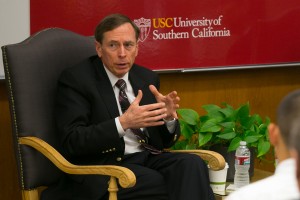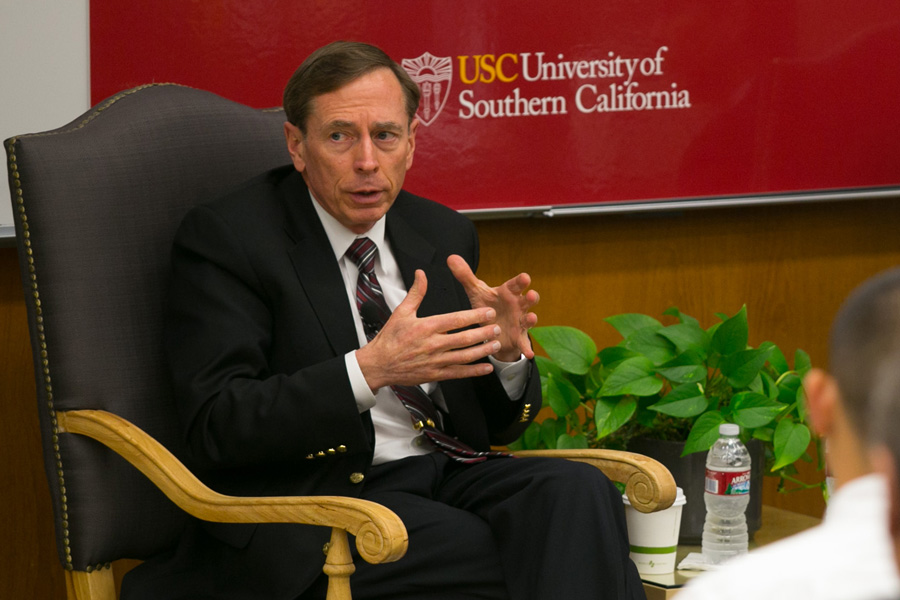Gen. Petraeus speaks on past leadership
Gen David Petraeus said his tenure as commanding general in Iraq and director of the CIA included countless sleepless nights, catching a stray bullet in the chest and even a mountain bike race against former President George W. Bush.

Gen. Ed. · David Petraeus, a USC Judge Widney Professor, talks to students on Tuesday about his experiences serving as commander general of the Iraq forces and CIA director. – Tom Queally | Daily Trojan
Petraeus, a USC Judge Widney Professor, gave leadership advice and described his experience working in the upper echelon of government services in a lecture he gave in MDA 325, “Case Studies in Modern Leadership,” on Tuesday.
The class, taught by Dan Schnur and Bill Simon, includes guest lectures by prominent figures in politics, business and the media.
Petraeus spoke of how his experience as the commanding general in Iraq shaped his understanding of leadership, starting from the moment he was given the job.
“I basically went to the White House for a meeting and came out with a new job,” Petraeus said of being appointed the commanding general of U.S. troops in Iraq by Bush.
Though leading U.S. soldiers in Iraq was both grueling and emotionally draining, Petraeus said he counts the experience among his most valuable.
“You cannot imagine anything more awesome on a good day, but there aren’t many good days. We had a few good days,” he said. “A good day was no casualties and also no Iraqi casualties.”
Petraeus said the deaths of U.S. soldiers took an emotional toll on him even when he did not know them personally. He was also injured during his time in the military in what he called a “freak accident” when he was hit by a stray bullet shot by one of his own soldiers.
The general also said that the complexity of his job made it especially draining. Petraeus envisioned the military working differently than previous operations. When a soldier asked him if he saw the World War II general Douglas MacArthur as a role model, Petraeus explained that his vision more closely aligned with Rudy Giuliani’s strategy as mayor of New York City.
“I think of Rudy Giuliani trying to patch broken windows in New York. And that’s sort of the way we looked at it,” Petraeus said. “The idea is if you fix the broken window, it doesn’t turn into the derelict building that turns into the crack house that destroys the neighborhood. You have got to stop that early on.”
His role in Iraq, Petraeus said, focused on more than traditional combat — U.S. troops were rebuilding communities, patching roads and repairing schools. He hoped their efforts could help Iraqi citizens feel more secure in their homes, and turn the tide of violence in the country.
“There is nothing easy about it, but there is also no greater privilege,” he said of serving in the military.
Petraeus’ string of positions spanned two presidencies: Bush’s and President Barack Obama’s. Asked to describe the differences between the two presidents, Petraeus called the comparison “apples and oranges.”
He spoke highly of both presidents, praising Obama’s exhaustive decision-making process and Bush’s resolve in difficult situations. Petraeus has even gone mountain biking with Bush and said that even though he rode the president’s tail the whole ride, “the president always finishes first.”
Petraeus said he admires both presidents for the difficulty of their job, noting that the wealth of factors both Bush and Obama had to consider complicated their decisions.
“You can’t divorce the battlefield from Capitol Hill politics, coalition politics, the fiscal deficit,” he said. “You name it, there are factors that [the president] has to grapple with. In his decision-making equation, those are factors. In mine, they are informing, but not driving, factors.”
Regardless of the industry or field, Petraeus said everyone from world leaders to CEOs to aspiring entrepreneurs has to focus on the “big ideas” in order to effect change.
“If you don’t get big ideas right, you don’t get Facebook, you don’t get Google,” he said. “These are all built on big ideas. In Iraq, the surge that mattered most was the surge of ideas, not the surge of forces. Big ideas don’t hit you on the head like Newton’s apple if you stand under the right tree. Big ideas are hard.”
The general also said he learned the value of cooperation in his positions of leadership, noting that “no one of us is smarter than all of us together.” In Iraq, when his team drafted the counter-insurgency manual for U.S. troops, Petraeus said the most effective meetings he had included journalists, intellectuals and experts in addition to military officers.
Though he looked back on his career fondly, Petraeus also said his high-ranking positions showed him how lonely being a leader can be.
“The truth is you don’t have anybody to talk to, actually … At the end of the day, there is one commander or one leader and that is you,” Petraeus said. “There are really no peers in those situations.”
Editor’s note: This post has been updated.

